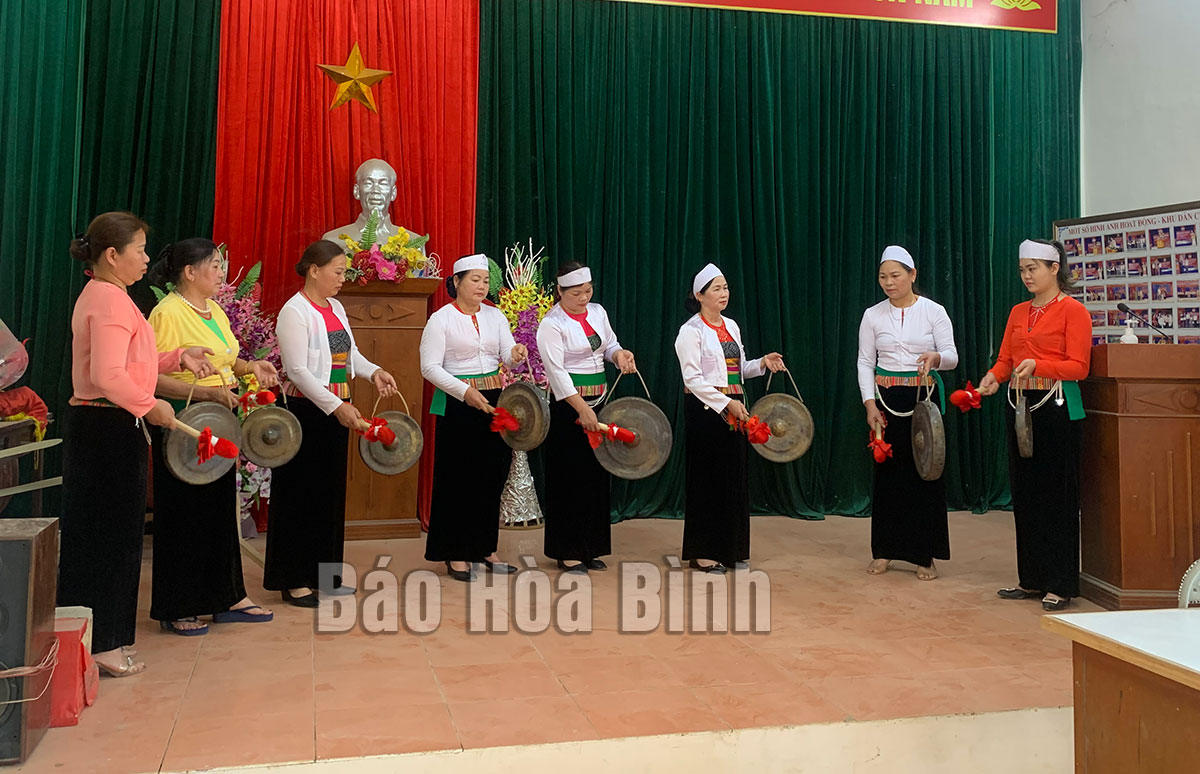
(HBO) – In the recent past, the amateur musical movement in Luong Son district of Hoa Binh province has developed strongly. Amateur musical clubs and troupes have been set up in villages and residential areas with the participation of a large number of people of all ages, thus helping enrich the community’s spiritual life and preserve traditional cultural values.
Members of the musical troupe of Coi village in Tan
Vinh commune (Luong Son district) rehearse gong performances to prepare for
coming shows.
Coi village boasts a strong amateur musical
movement in Tan Vinh commune. Bui Thi Chinh, head of the village’s musical
troupe, said they gather at the village’s cultural centre every weekend evening
to train for the coming communications contest as well as major anniversaries
and local political events. Thanks to these training sessions, members have
also had a chance to better understand one another and enhance solidarity.
At present, amateur arts troupes in localities
of Luong Son district are busy preparing for the communications contest 2022.
Aside from modern singing and dancing performances, folk songs, dances and
traditional musical instruments are also form part of their shows so as to help
preserve traditional culture.
Nguyen Thi Thu Hang, head of the district’s
culture and information division, said the amateur musical movement is
developing strongly. Aside from grassroots art troupes in localities, many
agencies, associations and organisations also set up their musical clubs and
troupes.
She noted a number of these clubs and troupes
have utilised private funding to purchase performance costumes and musical
instruments, maintain their activities, and take part in contests and shows at
different levels. In addition, they have also made use of their performances to
disseminate the Party’s guidelines, the State’s policies and laws, and their
localities’ regulations, which has received warm support from the local
audiences.
To continue helping implement the plan on
preserving and bringing into play outstanding intangible cultural heritage
values of ethnic groups in Hoa Binh province for the 2018 - 2030 period, the
culture and information division of Luong Son district has worked with the
Centre for Culture, Information and Communications to open annual training
courses on the Muong ethnic group’s gong culture, folk songs and folk dances
for local art troupes. The move also aimed at creating a new generation of
young artisans who will uphold the cultural heritage, including songs and
dances, of the Muong people, according to Hang./.
With an increasingly vibrant and widespread emulation movement aimed at building cultured residential areas and cultured families, Yen Thuy District has been making steady progress toward improving both the material and spiritual well-being of its people, while fostering a civilized, prosperous, beautiful, and progressive community.
Once lacking recreational spaces and community facilities, Residential Group 2 in Quynh Lam Ward (Hoa Binh City) has recently received attention for the construction of a new, spacious, and fully equipped cultural house. The project followed the model of state support combined with public contributions in both labor and funding.
The "All people unite to build cultural life" movement, which has been effectively integrated with Kim Boi district’s socio-economic development goals, is fostering a lively spirit of emulation across local residential areas, hamlets, villages, public agencies, and enterprises. In addition, through the initiative, traditional cultural values are being preserved and promoted, while community solidarity and mutual support in poverty reduction and economic development are being strengthened.
A working delegation of the Hoa Binh provincial People’s Committee led by its Permanent Vice Chairman Nguyen Van Toan on June 11 inspected the progress of a project to build the Mo Muong Cultural Heritage Conservation Space linked to tourism services in Hop Phong commune, Cao Phong district.
Born and growing in the heroic land of Muong Dong, Dinh Thi Kieu Dung, a resident in Bo town of Kim Boi district, in her childhood was nurtured by the sweet lullabies of her grandmother and mother. These melodies deeply imprinted on her soul, becoming an inseparable part of her love for her ethnic group's culture. For over 20 years, this love for her hometown has driven Dung to research, collect, and pass down the cultural values of the Muong people to future generations.
In the final days of May, the Ethnic Art Troupe of Hoa Binh Province organized performances to serve the people in remote, mountainous, and particularly disadvantaged areas within the province. These were not just ordinary artistic shows, but they were the meaningful journeys aimed at spreading cultural values, enhancing the spiritual life of the people and contributing to the preservation of ethnic minority cultural identities.



